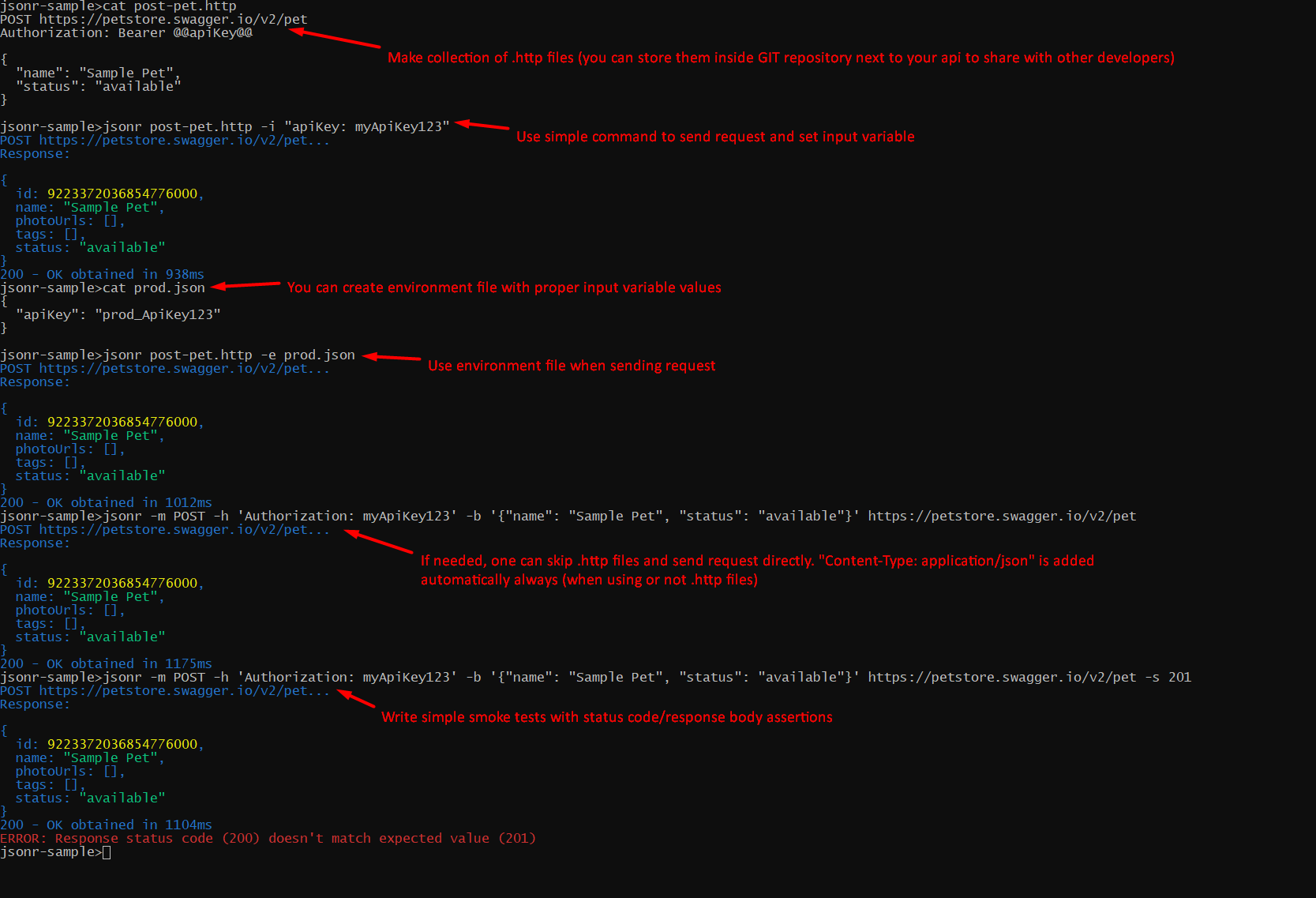About
- 📟 Are you tired of your UI http client asking you to sign in/sign up so
they can create proper
workspacefor you? (and get your email to send you marketing emails) - :hourglass_flowing_sand: Are you waiting for ages until your UI http client loads all it’s functionalities and plugins that you don’t need?
- 🗄️ Are you spending lots of time trying to find requests you’ve sent to given api months ago?
- 🔬 Are you searching how to change request method in
curlbecause you don’t usecurlthat often? - 📋 Are you working with modern json http api’s?
- :dash: Do you want to write smoke tests for your api?
- 🔗 Need a scripting tool to chain requests?
jsonr is a simple CLI tool for interacting with json http api’s and writing
simple smoke tests. It’s available from your terminal anytime when you need it
(so you don’t need to switch context) and it’s not aimed to be an ultimate
solution for everything. That’s why it’s so simple to use. No more need to
browse lots of documentation about tons of features that you don’t need. 5
minutes and you are ready to send any requests.

Run jsonr --help for details.
Prerequisites
Deno runtime environment https://deno.land
Installation
Option 1: Install via Deno (Recommended)
Prerequisites:
- Deno runtime environment
Install Command:
deno install -g --allow-write --allow-net --allow-read -f -r -n jsonr jsr:@sobanieca/jsonrTo update to the latest version, run the same installation command
--allow-write permission is needed only if you are planning to use -o
parameter (write response body to file, check jsonr --help for details)
Option 2: Pre-compiled Binaries
Download the latest pre-compiled binary for your operating system from the releases page:
Example for Linux x64:
curl -L -o jsonr https://github.com/sobanieca/jsonr/releases/latest/download/jsonr-linux-x64
chmod +x jsonr
sudo mv jsonr /usr/local/bin/Available binaries: jsonr-linux-x64, jsonr-linux-arm64, jsonr-macos-x64,
jsonr-macos-arm64
SSL Certificate Issues
If your requests are failing due to certificate validation errors (and you trust
target server) you can run temporary command like:
deno run --allow-net --unsafely-ignore-certificate-errors jsr:@sobanieca/jsonr ...
It will display warning about disable ssl verification, but you should be able
to perform requests. If you work frequently with such unsafe servers you can
consider introducing jsonr-unsafe sitting next to your main jsonr instance:
deno install -n jsonr-unsafe -g -f -r --unsafely-ignore-certificate-errors --allow-net --allow-read --allow-write jsr:@sobanieca/jsonr
Usage
Sample usage:
jsonr -h "Authorization: Bearer MyToken" my-request.http
my-request.http file content:
POST http://my-api.com/endpoint
{
"someKey": "someValue"
}Type jsonr --help for more details on usage once you have a tool installed.
Programmatic Usage (SDK) - chaining requests
The jsonr SDK allows you to use jsonr programmatically in your
JavaScript/TypeScript scripts, enabling you to chain multiple requests and
handle responses in code.
To get started, generate a template script:
jsonr --init
jsonr --init ./requests/get.http
jsonr --init https://api.example.com/endpointThis creates a jsonr-script.js file that you can customize. Here’s an example
that creates a user and then posts an order using the returned user ID:
import { jsonr } from "jsr:@sobanieca/jsonr/sdk";
// Create a new user
const userResponse = await jsonr("https://api.example.com/users", {
method: "POST",
body: {
name: "John Doe",
email: "john@example.com",
},
status: 201,
});
const userId = userResponse.body.id;
console.log(`Created user with ID: ${userId}`);
// Create an order for the newly created user
const orderResponse = await jsonr("https://api.example.com/orders", {
method: "POST",
body: {
userId: userId,
items: ["product-123", "product-456"],
total: 99.99,
},
status: 201,
});
console.log(`Order created with ID: ${orderResponse.body.id}`);Important: The SDK is designed for top-level scripts only. Do not use
jsonr as a library within your application, as it logs to stdout and calls
Deno.exit(1) internally, which may interfere with your application’s behavior.
Working with Large Responses
When dealing with large response bodies, you can pipe the output to grep to
filter specific content:
# Search for a specific property in a large JSON response
jsonr my-api-request.http | grep "someProperty" -C 10
# Extract specific fields from JSON responses
jsonr my-api-request.http | grep -E '"(id|name|email)"' -C 2Hints
- If you want to disable colors (at least for main log messages), you can use:
NO_COLOR=1 jsonr ...- It is recommended to wrap URLs with quotes to avoid shell conflicts:
jsonr "https://api.example.com/users?filter=active&sort=name"Contribution
If you want to implement/request new features you are more than welcome to contribute. Please keep in mind that this tool is supposed to be super simple to use and cover ~80% of use cases for playing around with JSON HTTP API’s. Instructions (–help) for this tool should be possible to read in less than 5 minutes. If more features will be added this may be hard to achieve.